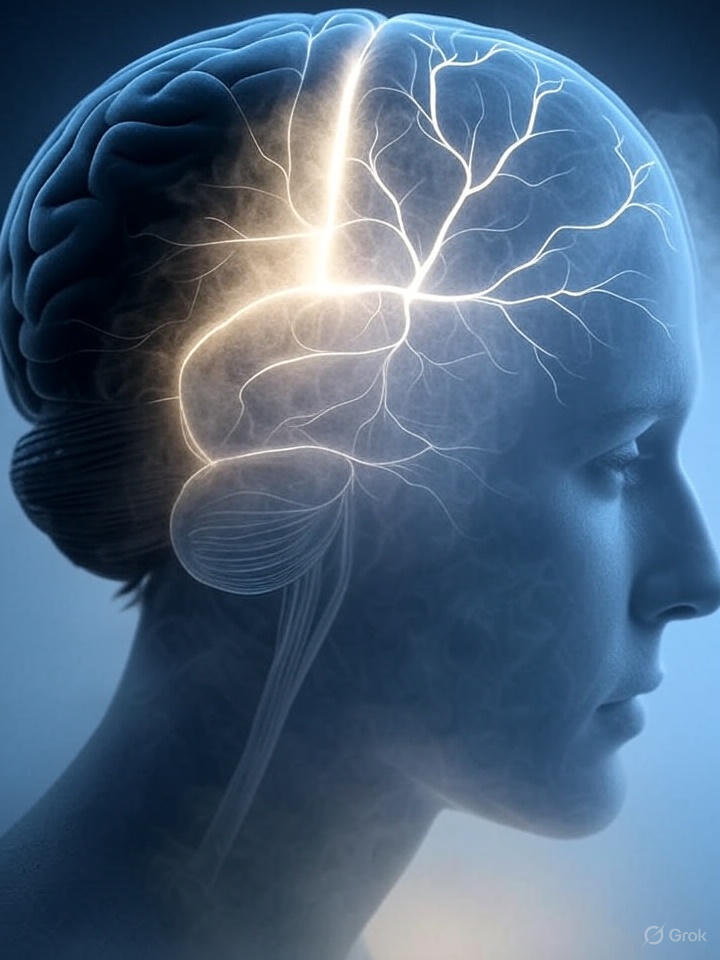Brain health research has a fundamental measurement problem.
Scientists can identify lifestyle factors that might protect cognitive function. They can point to proper nutrition, regular exercise, mental challenges, and social engagement.1 But they can’t prove these connections definitively.
The reason is simple. How do you measure someone’s brain health without knowing what their brain’s potential actually is?
I don’t think we have the technology yet to distinguish neural impulses responding to pain from neural impulses responding to an idea. We can’t determine how much energy someone puts into a specific thought process versus how much they should be putting into it.
This is where modern science falls apart. There’s no standard measurement that applies across the board because everyone is so different.
Ancient Systems Solved What Modern Research Cannot
While modern researchers struggle with measurement, traditional modalities like Ayurvedic medicine and Chinese medicine have empirical data spanning centuries.2
These systems don’t isolate cognitive function. They treat the brain as part of a whole system.
Recent research validates this approach. A groundbreaking study published in the Journal of the American Medical Association (JAMA) Neurology3 found that 88% of cognitive performance links directly to lifestyle factors rather than brain pathology. Even people whose brains showed physical signs of Alzheimer’s maintained cognitive function through healthy habits.4
The implications are staggering. Up to 45% of dementia cases5 could be prevented through lifestyle modifications, according to research published in The Lancet.
The Electrical System Nobody Talks About
Your brain operates on electrical signals. As you age, these signals weaken following Ohm’s law.6
Some individuals have such poor nervous system activity that messages from the brain lose strength along the way. Physical structures get impeded. Surrounding tissue that insulates neural impulses degrades.
This electrical degradation affects everything from motor function to cognitive clarity.
The Hidden Pathogen Connection
Brain fog isn’t just about weak electrical signals. Research reveals that 10-30% of Americans7 carry brain parasites that disrupt cognitive function.
Parasites like Toxoplasma gondii elevate glutamate levels, causing neural damage and altered brain connectivity. They affect dopamine and serotonin systems linked to mental clarity.8
This explains why some people experience persistent brain fog despite healthy lifestyle choices.
A Different Approach to Brain Health
At Rocket Nutrition, we developed Rocket Brain specifically to address these overlooked factors.
Our approach targets pathogens in the brain that contribute to cognitive decline. We use herbs and plant parts that have been part of human health systems for thousands of years.9
Our proprietary manufacturing process extracts significant levels of efficacy that competitors miss. We understand the electrical system of the body and how it connects to cognitive function.
The people closest to you know your good days from your bad days better than any brain scan. When you clear the fog, they notice first.
Brain health after 40 requires more than the four lifestyle factors researchers identify. It demands addressing the electrical and pathogenic factors that conventional medicine overlooks.
These statements have not been evaluated by the FDA. Our products are not designed to cure or treat any disease. Always consult your healthcare practitioner before taking any supplement and discontinue use if you experience negative effects.
References and Footnotes
1 Boyle, P.A., et al. (2024). “Lifestyle factors and cognitive resilience in aging.” JAMA Neurology. https://jamanetwork.com/journals/jamaneurology/fullarticle/2813583
2 This finding challenges the traditional view that brain pathology directly determines cognitive decline, suggesting that lifestyle interventions can maintain function even in the presence of disease markers.
3 Livingston, G., et al. (2020). “Dementia prevention, intervention, and care: 2020 report of the Lancet Commission.” The Lancet, 396(10248), 413-446. https://www.thelancet.com/journals/lancet/article/PIIS0140-6736(20)30367-6/fulltext
4 Neural signal degradation follows principles similar to electrical resistance, where signal strength diminishes over distance and through damaged pathways. See: Bear, M.F., Connors, B.W., & Paradiso, M.A. (2020). Neuroscience: Exploring the Brain. 4th ed. https://www.ncbi.nlm.nih.gov/books/NBK10799/
5 Flegr, J., Prandota, J., Sovi?ková, M., & Israili, Z.H. (2014). “Toxoplasmosis–a global threat. Correlation of latent toxoplasmosis with specific disease burden in a set of 88 countries.” PLoS One, 9(3), e90203. https://www.ncbi.nlm.nih.gov/pmc/articles/PMC3963851/
6 Parlog, A., Schlüter, D., & Dunay, I.R. (2015). “Toxoplasma gondii-induced neuronal alterations.” Parasite Immunology, 37(3), 159-170. https://pubmed.ncbi.nlm.nih.gov/25376390/
7 Traditional herbal medicine systems like Ayurveda and Traditional Chinese Medicine have documented use spanning over 3,000 years. For comprehensive review, see: World Health Organization. (2019). “WHO Global Report on Traditional and Complementary Medicine 2019.” https://www.who.int/publications/i/item/9789241515436
8 The four lifestyle factors most commonly identified by researchers include: regular physical activity, cognitive engagement through learning, social interaction and community involvement, and adherence to a Mediterranean-style diet rich in omega-3 fatty acids. For comprehensive review, see: National Institute on Aging. (2019). “Cognitive Health and Older Adults.” https://www.ncbi.nlm.nih.gov/pmc/articles/PMC6411156/
9 Ayurvedic medicine dates back over 5,000 years, while Traditional Chinese Medicine has over 3,000 years of documented practice. Both systems emphasize holistic approaches to brain health through diet, meditation, herbal remedies, and energy cultivation practices. See: National Center for Complementary and Integrative Health. “Traditional Chinese Medicine: What You Need to Know.” https://www.nccih.nih.gov/health/traditional-chinese-medicine-what-you-need-to-know

